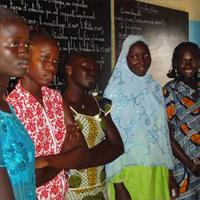AFRICA: ‘Sexually-transmitted grades’ kills quality education

Sexual exploitation in African schools has become so widespread that children have come up with their own terms to refer to sexual relations with their teachers.
From ‘Sexually Transmitted Grades’ to ‘BF’, or bordel fatigue, which refers to exhaustion from multiple sexual activities with teachers, this slang hints at the prevalence of exploitation in Africa’s learning environments.
The lexis of abuse was discovered during research for Plan International’s (PI) latest report, ‘Learn Without Fear,’ part of the organisation’s global campaign to end violence in schools.
“We’ve been aware of the problem for a long time but we’ve had to just go on anecdotal evidence of violence and its effects,” John Chaloner, PI Regional Director for West and Central Africa, told IRIN. “What this report has done is to talk to children, to teachers and to parents. So now we’re dealing with evidence not hearsay”.
Drop out danger
As schools reopen throughout Africa, the report reveals alarmingly high levels of violence, which are undermining government efforts to provide quality education. The report concluded many girls and boys are dropping out of school as a result of sexual abuse and corporal punishment.
“Our teachers should be there to teach us and not to touch us where we don’t want,” a 15 year-old girl from Uganda told PI, “I feel like disappearing from the world if a person who is supposed to protect me, instead destroys me”.
According to the report, research in Uganda found that eight per cent of 16 and 17 year-olds had had sex with their teachers. In South Africa, at least one-third of all child rapes are by school staff. In a survey of ten villages in Benin, 34 per cent of children confirmed sexual violence in their schools.
While boys usually suffer more violent – and possibly deadly - corporal punishment at the hands of their teachers than their female classmates, sexual harassment and exploitation appear to be overwhelmingly carried out against girls. The report found girls are vulnerable to attacks not only from teachers and other care givers, but also from male students, either at school or on the journey to or from school.
“Teachers often justified the sexual exploitation of female students by saying that their clothes and behaviour were provocative, and that they, the teachers, were far from home and in sexual need,” according to PI’s report.
Sex exchange
What can appear a ‘grey area’ in this situation is the apparent collusion of some female students.
‘Africell’, or ‘a free sell’ has been coined to describe girls who do not wear underwear to provoke teachers into sexual activities in exchange for good grades or ‘sexually transmittable means’ – food, school materials or school fees.
But these girls are not the instigators, said Atoumane Diaw, Secretary General of the National Union of Elementary Teaching in Senegal.
“These children are often encouraged by their parents. Do you think a ten year-old is going to buy herself ‘sexy’ clothes? No, it is the system, it is society that is corrupt. These poor families need [financial] help so they won’t put themselves into this situation”.
In addition to financial assistance, Diaw suggested practical measures for schools: “A modest uniform for students so everyone looks the same. Separate toilets for boys, girls or teachers. And surveillance so that the teacher is not left alone with a pupil after class”.
Poverty facilitates the abuse, according to PI. Children are increasingly responsible for the economic welfare of their families; teachers are often underpaid, or not paid at all, with some seeing sexual favours from students as ‘compensation’.
Authors of the report noted that in many African cultures, corporal punishment is often viewed as an acceptable form of discipline. Social norms that encourage male aggression and female passivity are also seen to champion various forms of violence against girls.
Speak out
“We need to educate people so we tackle the problem [of violence] before it happens.” said Atoumane Diaw. “Our campaign is…raising awareness with teachers. We’re educating children about their rights and their worth. Laws have to be harmonised and enforced in different countries. We must go forward together, fight together.”
The Kenyan education ministry recently launched guidelines on school safety after a recent deadly spate of high school student riots.
Violence in schools, and particularly sexual violence, is chronically under-reported because of cultural norms, students’ feeling of shame, and because they do not know in whom they can confide, according to PI’s report. It adds teachers are often reluctant to report colleagues’ abuse.
“As adults, we need to be watchful, we need to be alert.” PI’s John Chaloner told IRIN, “Children need outlets, like help lines, so they can express themselves. We need to get the message out so that children will no longer be harmed by the very people who should be protecting them”.
 Back and Next - Back and Next
Back and Next - Back and Next See Also - See Also
See Also - See Also